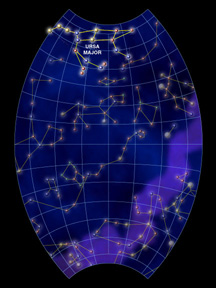The constellation Ursa Major can be seen near the Celestial North Pole all year long.
Click on image for full size
Windows to the Universe original image
Ursa Major
Ursa Major is a very famous constellation. It is also called the Great Bear. Ursa Minor is the Little Bear. The body and tail of the Big Bear make up the Big Dipper. There are a lot of myths about this constellation.
The Greeks say that Zeus was in love with Callisto. When his wife, Hera, found out, she turned Callisto into a bear. Zeus put her in the sky with her son Arcas, who is the Little Bear. Some Native Americans thought the bear was being chased by three hunters. The hunters were the three stars in the handle of the dipper.
There are lots of neat objects to look at in Ursa Major. The two stars that make up the right edge of the "bowl" of the dipper are pointer stars. If you connect them with a line and extend it North, you will run into the North Star, Polaris. There are two galaxies above the bear's head, called M81 and M82. M81 is one of the brightest galaxies you can see without a telescope.
Just below the star Dubhe, which is the lower pointer star, is the Owl Nebula. Some images show what looks like a pair of eyes. Ursa Major is circumpolar, which means you can see it all year long. So, go outside and find this huge constellation tonight!
You might also be interested in:

How did life evolve on Earth? The answer to this question can help us understand our past and prepare for our future. Although evolution provides credible and reliable answers, polls show that many people turn away from science, seeking other explanations with which they are more comfortable.
...more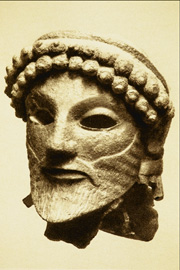
In Greek mythology, Zeus (Jupiter in Roman mythology) was the king of heaven and Earth and of all the Olympian gods. He was also known as the god of justice. He was named king of the gods in the special
...more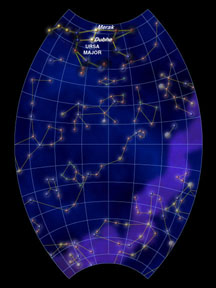
What's in a Name: Arabic for the "flank" of the Bear. Claim to Fame: One of the famous Pointer stars that point to the North Star. Type of Star: White Main Sequence How Far Away: 62 light years away How
...more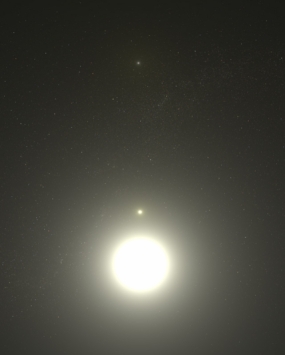
What's in a Name: So named because it is the closest star to the celestial north pole. Claim to Fame: It's the famous North Star! (actually a triple star system) Type of Star: Yellow-white Supergiant
...more
What's in a Name: Arabic for "bear" Claim to Fame: One of the famous Pointer stars that point to the North Star. Type of Star: Orange Giant How Far Away: 75 light years away How Bright: 100 times brighter
...more
Windows Scientists found twelve new stars! No, not really! But they did create twelve new pages about some of the brightest stars in the night sky. Some of the constellations are Leo, Ursa Major and Virgo.
...more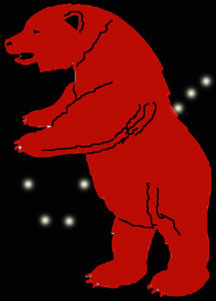
Callisto was a river goddess. Callisto was the favorite companion of the moon goddess Diana. She used to accompany Diana on the hunt. One day the god Jupiter saw the beautiful Callisto and fell in love
...more
In the story of the Changing Bear Maiden, a girl gets very angry and changes into a bear. She chases after her little sister and seven brothers. She kills six of the seven brothers, but the youngest one
...more


